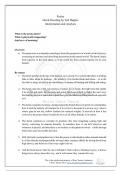Poetry
Hawk Roosting by Ted Hughes
Interpretation and Analysis
What is the poem about?
What is physically happening?
(top layer of meaning)
Overview
• The poem acts as a dramatic monologue from the perspective of a hawk (a bird of prey),
overseeing its territory and describing its position in the natural world. The hawk clearly
feels superior in the food chain, as if the world has been created entirely for its own
benefit.
By stanza
1. The hawk perches at the top of its domain, eyes closed. It is content that there is nothing
fake or false about its makeup – the lethality of its hooked beak and talons – or in the
fact that in sleep, as well as in wakefulness, it dreams of hunting and killing and eating.
2. The hawk marvels at the convenience of nature for its hunts: the high trees that enable
it to see far and wide; the thermals and winds that keep it aloft in flight; the sun’s rays
the blind its prey as it bears down upon them; the fact that everything must look upwards
at it.
3. The hawk considers its talons, clamped upon the branch that is its perch. It contemplates
how it took the entirety of Creation for it to evolve to the point it is at now (e.g.: talon’s
whose grip do not tire, hollow feathers for reduced weight). It marvels at how it has
evolved to the point where it holds the lives of all other animals in its talons.
4. The hawk continues to consider its position, this time imagining soaring high and
slowly, encircling its domain leisurely. It considers how it can kill wherever and
whenever it pleases, and that there is no trickery or deception involved – it kills through
brute force and irrevocable decision.
5. Still, the hawk contemplates how it has the power to allot death to other animals beneath
it: it flies directly and purposefully through other creatures (likely by diving down from
high above), and believes it has every right to do so.
6. And the hawk knows that the sun is behind it when it dives, blinding its prey; it knows
things have always been this way, and it will ensure they remain this way.
This is the intellectual property of Ross Turner Academics
© Ross Turner 2023 | www.rossturneracademics.com
, What else might the poem be about?
What is metaphorically happening?
What is the purpose/theme/message of the poem?
What ideas might the poet have wanted the reader to consider?
(deeper layers of meaning; more complex interpretations)
Overview
• Perhaps the poem as a whole uses the clear hierarchical structure of the natural world
(the food chain) as a metaphor for the wider structures of the human world and how
these structures can be (and often are) abused.
• Perhaps it refers to wider positions of authority, such as governments or dictators or
organisations, who have a great deal of power over others, and might (and often do)
abuse that power.
Connotations relating to the metaphor
• Hawks have connotations of being predators, hunters, killers. They are also considered
to be intelligent, and they have very sharp eyesight.
• Perhaps this is representative of how people or bodies in positions of power have the
ability to bear down upon those who are weaker, or merely smaller, than themselves,
and could do at any moment, seemingly on a whim.
• Hawks, as with other predators, act on instinct. This might make them unpredictable: if
they are hungry, they will kill without a second thought; if they are not, they will not.
Their power is absolute, and they wield it without consideration for anything other than
their own needs and desires. If this is to be considered a metaphor for the human world,
those with power wield it over others without consideration for the damage they might
cause – they have only their own needs and desires in mind. Consider the harm this
does when official bodies such as governments are wielding this kind of power –
organisations that are, supposedly, always acting in the best interests of the people
(those without the power of the government behind them), apparently working for the
people.
Emotions, moods, and feelings present in the poem
• Power (and the abuse of power).
• Dominance.
• Sense of achievement.
• Nature.
• Death.
• Conflict.
This is the intellectual property of Ross Turner Academics
© Ross Turner 2023 | www.rossturneracademics.com





